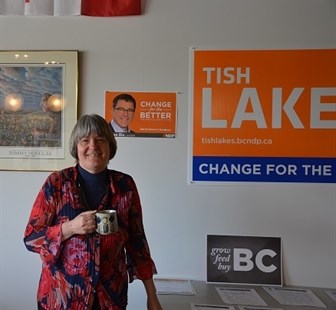
(JULIE WHITTET / iNFOnews.ca)
May 01, 2013 - 12:11 PM
Up until a couple weeks ago Tish Lakes didn't have an election campaign on her agenda. But a surprising turn of events ousting Kelowna-Mission's former NDP candidate has Lakes strategizing how she will govern the next four year term.
Having ran as a federal candidate for Lake Country in 2008 gives her an advantage. Many of her constituents already know her from the previous campaign, her non-partisan work in the community and from the doorstep. And there's time yet.
“The good thing is the final two weeks are when people really start paying attention,” she says.
While busily re-ordering election signs, printing pamphlets and attending forums, Lakes is also working a full-time day job. As Director of the Okanagan Advocacy and Resource Society she helps people with chronic mental illness navigate the legal ropes of getting the government services they are entitled. If deciphering the mythology of law can be challenging for the lay man, it's that much harder for someone with mental illness she says.
This gives her first-hand expertise with the welfare of Kelowna residents and the challenges of accessing adequate housing, food and necessities in the city.
“I was assisting someone this morning over a tenancy issue and it puts me face-to-face with what government services are really like,” she says. And sometimes this brings her to Liberal MLA offices including that of her fellow candidate Steve Thomson.
Housing is a critical issue in Kelowna, she says. There's been an expansion of high-end housing and not much else.
“The Canada Mortgage and Housing Survey indicates of all the communities in B.C. Kelowna is in the top three for the least available rental spaces,” she says.
It is extremely difficult for those struggling with mental illness or disability, who cannot work or have little savings, to find low-rent accomodation in Kelowna.
“Your stability in your life starts with housing,” she says.
And with better housing comes better health, saving other costs down the road. Social justice isn't a mere exercise in idealism – it makes good economic sense, she says. But cities and local governments can only do so much. Lakes says we need a provincial government on board to solve the issues and Adrian Dix has pledged to create more subsidized housing.
How does the B.C. NDP propose to pay for these programs?
Lakes says it starts with fostering a strong job market in local agriculture and forestry sectors. The NDP also plans to generate new revenue from re-introducing the bank tax, raising corporate tax rates and increasing tax rates for the top two percent of income earners in B.C.
Knowing B.C. inside and out from travelling the province as a tree-planter in her college days, Lakes says she's noticed British Columbians are lacking the political leverage they once had. Especially when it comes to regulating energy projects.
“Right now public trust is not there, we have to restore that,” she says. This means bringing back environmental reviews for crude oil pipelines and liquid natural gas.
“The public wants those discussions – we want to be able to use the resources of B.C. for the benefit of British Columbians,” she says. She points to the time when public outcry forced logging companies to start revising their practices.
As a veteran activist, Lakes has witnessed political change happen and is confident it can happen again. She had a hand in pioneering the womens' movement in the 1970's during her studies at UBC, inspiring her to switch majors from biological science to pyschology.
“We were just starting to look at issues of violence against women at a time when talking about women being beaten in the family home was very controversial, talking about sexual assault was very controversial,” she says. She also volunteered alongside the women responsible for establishing Vancouver's first transition houses.
“When you look at political issues today you get afraid that nothing changes, but I can at least look at that issue and say there's been some very substantial and positive change,” she says.
To contact the reporter for this story, email Julie Whittet at jwhittet@infotelnews.ca or call (250)718-0428.
News from © iNFOnews, 2013